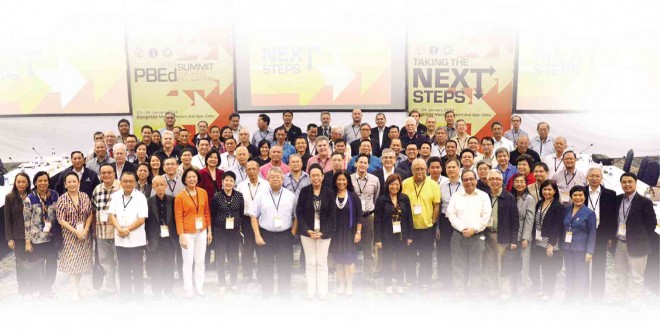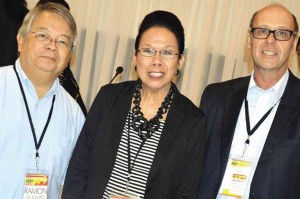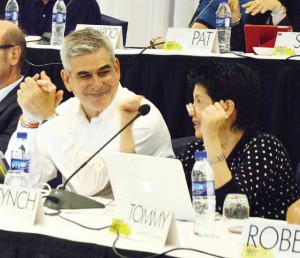Brainstorming on how to scale up the academe-industry partnership

AT THE SUMMIT Higher education and business leaders come together to talk about producing better quality graduates.
Believing that local companies can get involved in education and close the gap between the needs of industries and the skills of graduates, the Philippine Business for Education (PBEd) gathered together school heads and business leaders last week to discuss how best “to scale up and institutionalize” such an industry-academe linkage.
This was the second year PBEd had organized the two-day Higher Education Summit with the support of the United States Agency for International Aid (USAID). With the thrust “Taking the next step,” the grand meeting was again held at the Shangri-La Mactan Hotel and Resort in Cebu.
“We are working together so that the Philippines will have a more competitive workforce,” said Robert Burch, chief of USAID Philippines’ office of education.
Imagine trying to get 100 leaders of industry, academe and the government to come together, the likes of Ayala Corp. chair Jaime Augusto Zobel de Ayala and Employers Confederation of the Philippines (ECOP) president Edgardo Lacson from business, and, from the academe, University of the Philippines president Alfredo Pascual, Ateneo de Manila University president Fr. Jett Villarin, SJ, De La Salle University president Br. Ricky Laguda, FSC, and University of Santo Tomas president Fr. Herminio Dagohoy, OP.
That’s a huge headache, right? But the reasons were urgent, in light of global challenges: to develop higher education policies, programs and structures; broker partnerships at the national and provincial levels, specifically in Cagayan de Oro, Batangas and Iloilo provinces, and other sites of USAID’s Cities Development Initiative, and stimulate continuous dialogue.
Divided into four groups, the summit participants drew up recommendations for human resource planning and development, more effective on-the-job training (OJT) and internship programs, industry-academe collaboration on research innovation, and promoting technical vocational education and careers.
Philippe Reveilhac, country president of Schneider Electric (SE), told the convenors that the country had such a huge potential.
SE’s Go Green in the City and dual system training partnership with the National College of Science and Technology in Dasmariñas, Cavite province, introduced students to the real world and instilled in them the values, discipline and skills needed by the industry, Reveilhac said.
At the same time, the company discovered brilliant minds and produced industry-skilled graduates for the workforce. Reveilhac said the victory of Ateneans Alyssa Vintola and Lorenz Payongan in the European energy management company’s 2013 Go Green in the City competition in Paris showed that Filipinos could outperform students from top schools in United States, France and Canada.
He said jobs awaited engineering students Vintola and Payongan at SE.

DEL ROSARIO, Licuanan and USAID deputy mission director Reed Aeschliman. PHOTO BY DIANE FAJARDO/CONTRIBUTOR
PBEd president Chito Salazar said SE’s experience with industry-academe linkages could be a model for other companies.
Defining HR
To address the mismatch between industry needs and the quality of graduates, Commission on Higher Education (CHEd) Commissioner Cynthia Bautista’s group suggested clearly defined human resource requirements in industry road maps, more one-to-one partnerships between schools and companies, and the development of students’ general competencies.
Bautista said the focus should be on honing students’ competencies, including the capacity to make ethical decisions, leadership, problem solving and basic cognitive skills.
Her group also recommended that employment or promotion should be based on competencies rather than degree.
Sensible OJT
Reveilhac said an internship was a way of developing human resources (HR). On-the-job training of about six months would give the intern enough time to learn about the industry and allow companies to decide if he/she should be hired.
University of Makati (UMak) president Tomas Lopez noted that large companies, like SE, initiated internships with schools “because it makes good business sense” and schools like UMak “have very successful OJT programs because their courses are niched along specific job opportunities.”
But he pointed out that courses included internships not as a strategy but to comply with requirements, “even when it does not make sense for enterprises to participate in them, nor for schools to [have] them.”
Lopez said students from schools in the provinces, especially those in generic courses, found it hard to meet requirements.
Lopez said local governments should be more involved in internships and CHEd should give local industry-academe partnerships more flexibility to design courses relevant to their communities.
Lopez’s group suggested the creation of an “online matching inventory database” of OJT applicants and companies.
CHEd Chair Patricia Licuanan said some college graduates had jobs that did not require degrees. Higher education institutions (HEIs) should start diversifying products and consider offering middle-level courses to improve competencies and provide alternative careers for the youth, she said.
Participants agreed on the importance of technical- vocation education and training (TVET) and the need to promote it among parents and youth as an alternative to college education.
Oscar Torralba, chair of CHEd’s Technical Panel for Business and Management, said that while TVET had proven to be a key driver for sustained competitiveness globally, it was considered second-class in the country.
To make TVET more appealing, his group recommended improving the delivery of technical-vocation programs, “rebranding” or creating a better image, delegating some functions of the Technical Education and Skills Development Authority to industry and schools, and increasing industry involvement in curriculum design, quality assurance, certification and accreditation.
Torralba emphasized the need for industries to inform the academe of their “long-term skills requirements to ensure that graduates are relevant.”
Research
Paco Sandejas, managing director of investment management company Narra Venture Capital, said communication was key in strengthening research collaborations.
Creating research round tables and online tools like the Brain Gain network (www.bgn.org), assisting Semiconductor and Electronics Industry in the Philippines Inc. with its think tank and institutionalizing business development officers in HEIs could foster continuous dialogue among sectors, he said.
His group also proposed building capacities for research and development by supporting CHEd’s Philippine-California Advanced Research Institutes project and empowering the presidential development council on research and development.
PBEd chair Ramon del Rosario in his closing remarks said: “We have all seen the value of talking to each other … Through these conversations, we have identified the issues that we should be concerned about. We have identified priorities that require our attention and hopefully, we can move these to the next level.”
Last year’s higher education summit led to the creation of the National Industry-Academe Council.
Salazar said the council’s goal was to support economic development, competitiveness and employment through greater and more appropriate industry involvement in the education system.



















